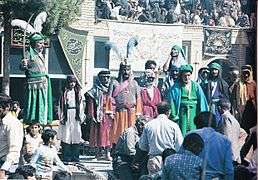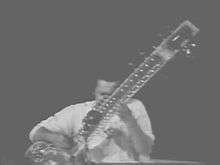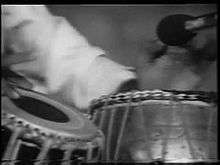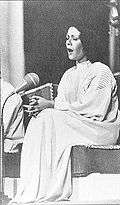Shiraz Arts Festival
| Shiraz-Persepolis Festival of Arts | |
|---|---|
 | |
| Genre | Various (music, dance, drama, poetry and film) |
| Location(s) | Shiraz and Persepolis in central Iran |
| Years active | 1967 - 1977 |
The Shiraz-Persepolis Festival of Arts (Persian: جشن هنر شیراز) was an international summer arts festival, bringing about the encounter between the East and the West. It was held annually for eleven years from 1967 to 1977 in the city of Shiraz and Persepolis in central Iran.
History
Accompanied by symposia and debates, the festival program included music, dance, drama and film, performed in a variety of locations in Shiraz and surrounding areas. The venues included the ruins of Persepolis (ceremonial capital of ancient Persia), Naqsh-e Rostam, Hafezieh, Bagh-e Delgosha, Narenjestan, Bazaar-e Vakil, Jahan-Nama Garden, Saray-e Moshir and a concert hall on the Shiraz University campus.

Some of those who appeared at the festival are: In theatre, Jerzy Grotowski, Peter Brook, Tadeusz Kantor, Arby Ovanessian, Bijan Mofid, Davoud Rashidi, Peter Schumann, Parviz Sayyad, Andrei Șerban, Robert Wilson, Shūji Terayama, Andre Gregory, Ali Nassirian, Víctor García, Joseph Chaikin, and Esma'il Khalaj. In this field, traditional plays such as ta'zieh (passion plays) from Iran, Kathakali from India, and Noh from Japan, as well as R. Serumaga with the National Theatre of Uganda, Duro Lapido & the National Theatre of Nigeria, and Pabuji Ki Phad from India were presented, amongst many others .

In music, Iran's traditional musicians were presented, amongst them Hassan Kassai, Jalil Shahnaz, Ahmad Ebadi, Faramarz Payvar, Ali-Asqar Bahari, Hossein Tehrani, Hossein Qavami and Abdolvahab Shahidi. The young masters included Hossein Alizadeh, Dariush Talai, Mohammad-Reza Lotfi, Majid Kiani, Mohammad-Reza Shajarian, Parisa and Noureddin Razavi-Sarvestani. Indian classical musicians who appeared were Vilayat Khan, Bismillah Khan, Sharan Rani, Pran Nath, Sundaram Balachander, Ravi Shankar, Ram Narayan, Chaurasia and Dagar. Traditional non-Western music, some including dance, were presented from Afghanistan, Algeria, Bhutan, China, Egypt, Indonesia, Iraq, Japan, S, Korea, Morocco, Nepal, Pakistan, Philippines, Rwanda, Senegal, Tunisia, Turkey, Vietnam.
In the field of Western music Yehudi Menuhin, Christian Ferras, Martha Argerich, Arthur Rubinstein and Yvonne Loriod appeared in concert or recital . The National Iranian Radio & Television Chamber Orchestra was a regular. Other participants in this field from Iran were Morteza Hannaneh, and the Tehran Symphony Orchestra. From the West, Gilbert Amy led the Orchestre du Domaine Musical, Bruno Maderna conducted the ORTF Orchestra as well as the Hague Residence Orchestra, Iannis Xenakis created "Persephassa" and "Persepolis", Karlheinz Stockhausen was prominently featured one year, Krzysztof Penderecki led the Polish National Radio Symphony, Cathy Berberian, the London Sinfonietta, the Melos Ensemble, Morton Feldman & the Creative Associates appeared as well as John Cage, the Juilliard String Quartet, the American Brass Quintet, Max Roach Quintet performing together with Abbey Lincoln and the Staple Singers, amongst others.
_(14553342799).jpg)
The twelfth festival was cancelled at the onset of the Islamic Revolution in 1978 out of concern for the safety of the performers.[1]
=
Gallery
 Shahre Gheseh by Bijan Mofid, 1968
Shahre Gheseh by Bijan Mofid, 1968 Moon and Leopard by Bijan Mofid, 1970
Moon and Leopard by Bijan Mofid, 1970
 Stockhausen's Mantra on 2 September 1972, Aloys and Alfons Kontarsky, pianos, electronics by the composer (foreground)
Stockhausen's Mantra on 2 September 1972, Aloys and Alfons Kontarsky, pianos, electronics by the composer (foreground)
 Ravi Shankar performs at the Shiraz Arts Festival in the 1970s
Ravi Shankar performs at the Shiraz Arts Festival in the 1970s Ram Narayan performs at the Shiraz Arts Festival in the 1970s
Ram Narayan performs at the Shiraz Arts Festival in the 1970s
 Parisa performs at the Shiraz Arts Festival 1967
Parisa performs at the Shiraz Arts Festival 1967
See also
References
- ↑
- Gluck, Robert (2007). "The Shiraz Arts Festival: Western Avant-Garde Arts in 1970s Iran" (PDF). Leonardo.
External links
![]() Media related to Shiraz Arts Festival at Wikimedia Commons
Media related to Shiraz Arts Festival at Wikimedia Commons
- "Festival of Arts, Shiraz-Persepolis", Mahasti Afshar (January 2015)
- Persian Music Ensemble at Shiraz Arts Festival, 1970 (Video)
- NZ On Screen. Sound the Trumpets, Beat the Drums, Tony Williams' film documentary of the 1969 festival